 Each year, about 100 million Americans participate in boating. That makes boating the most popular recreation activity, alongside fishing.
Each year, about 100 million Americans participate in boating. That makes boating the most popular recreation activity, alongside fishing.
To truly enjoy your time on the boat with your friends and family, you need to make sure that everyone is safe at all times.
Boat accidents are more common than you may think. In 2020, there were 5,265 recorded boat accidents in the US, up from 4,168 the previous year. 767 people lost their lives as a result of these accidents, with 3,191 others suffering non-fatal injuries.
Thankfully, ensuring boat safety is a lot easier than many people imagine. Read on for six safety tips that’ll help you maximize the benefits of boat ownership.
Table of Contents
Always Check the Weather
Checking and knowing the weather conditions before you set out to sail is very important as you can’t always predict the weather. It may be bright and sunny as you head down to the docks but this doesn’t mean that it’s going to stay like this all day.
Here are some basic tips that you can look out for while your out on the water:
- Be weather aware. Dark clouds, lightning and fog are good indicators that bad weather is approaching.
- Pay close attention to shifts in wind direction and temperature as these can tell you that the weather is changing.
- Continuously monitor radio and weather channels and ask for information about local weather patterns especially if your unfamiliar waters.
- Be observant of your surroundings and take note of what other boaters are doing. If you see other boats heading back to shore it can give you an idea of upcoming weather changes that you may not be aware of.
Paying attention and getting into the habit of always checking the weather can make the difference between a safe journey and a potentially fatal accident.
Invest in a Boat Safety Kit
It’s hardly possible to predict when an emergency will happen while you’re out boating. The best you can do is stay prepared for any situation. Ensure there’s a safety kit on board whenever you know there’ll be people on the ship.
One of the essentials in your boat safety kit is a flashlight. When it’s dark, and there aren’t lights on your boat, a flashlight can help you see around. It can also allow others to see you in case your craft stalls or is out of fuel.
Carry a well-equipped first aid kit, too, in case there’s ever a medical emergency while on board. Don’t forget to equip yourself with the knowledge on how to use the kit.
A whistle is also a necessary component of your safety kit as it’s a recognized signal for sending a distress signal while on the water. Bring a mirror on board, as well as it can help you signal for help when necessary.
Pack a fire extinguisher as well, in case a fire ever breaks out while you’re on board.
Have the Right Life Jackets
We’ve listed life jackets separately from other items in your safety kit because of how essential they are for boaters. For instance, 85 percent of people who drowned in boating accidents in 2017 weren’t wearing a life jacket. Considering that drowning accounted for 76 percent of all boating fatalities that year, it’s easy to see why life vests are indispensable during boating trips.
Make sure that the US Coast Guard approves the life jackets you invest in. Count the life jackets before starting the boat trip to ensure that there’s one for every person on board. Note that in some states, children must wear life vests at all times while onboard.
The jacket you purchase must fit you perfectly, so make sure you try it on before buying it. Be sure to maintain your life jackets regularly, so they don’t fail when you need them the most.
Check Your Boat for Harmful Fumes
Every time you refuel your boat, you need to open the hatches and smell any lingering fumes. If you detect any suspicious smells, don’t start the engine.
Be on the lookout for any possibility of carbon monoxide accumulation inside your boat. The gas can easily knock you and your guests unconscious and expose everyone to disaster.
Pay extra attention to areas where gases and fumes are most likely to accumulate, including canvas enclosures that aren’t adequately ventilated. Be on the lookout for blocked exhaust outlets as well
Avoid Overloading Your Boat
A common mistake people make is to assume that their boat can accommodate just about everything they can fit onboard. The fact is overloading your boat can be dangerous. Generally, smaller boats are easier to overload.
When you put too many people or boating equipment aboard, you increase the vessel’s instability. The chances of swamping in rough weather increase. But even if the waters are calm, overloaded boats are more likely to capsize, particularly when the boat makes a sudden turn.
Find out what your boat’s capacity restriction is, and stick to it.
Get Your Boat Serviced Regularly
Before taking a trip, it’s necessary to check your boat’s condition carefully. Generally, a thorough check involves inspecting the water craft’s body, boat equipment, safety kit, and trailer. Only when you’re satisfied that everything is in order should you use the vessel.
But besides the checks you do individually at home, you need to have your boat regularly serviced by a specialized workshop. Experts recommend taking your oat for service at least once a year, whether you’re an avid boater or use the vessel very little.
The primary goal of professional service is to ensure that your vessel’s vital parts stay in good shape. During the service, the professional will inspect and fix any problems with the boat’s electrical system, water pump, batteries, spark plugs, fuel system, propellers, and other parts.
Where you use your boat often, get the gearbox oil changed every three months.
Take a Course on Boating Safety
The vast majority of boating accidents are the result of operator error. That’s why it’s always a good idea to take a boating safety course before you start to operate a boat. Training is readily available to anyone interested, with organizations such as the National Safe Boating Council offering training both online and on-water.
Boat safety training helps you get familiar with boating rules and what is required of you as a boat operator.
Create a Float Plan
Before you head out on a boating trip, it’s always a good idea to leave a float plan with someone you trust. A float plan is basically is basically letting family, friends or relatives know where you’re going and plan to return.
A float plan may include the following details:
- Name, description and contact information about the owner/operator and the passengers aboard your boat.
- Boat size, type, registration, color, engine etc.
- Safety equipment onboard
- Trip details, departure date, return date, destination, route, stops along the way etc.
Fill one out and leave it with family, friends or relatives because if you do get stranded or are caught in a storm or have an emergency onboard it will save your life. Always let someone know that your are planning to go out boating because if you don’t arrive when they expect you to they can contact the authorities who will then check that you are safe.
Stay Safe While Boating
Boat safety starts with you. Make sure you do everything you can to prepare yourself, avoid dangerous activities on the boat, and follow boat safety procedures. Also, be sure to take boat safety courses that cover boat operation, boat maintenance, and boat accident prevention.
Boating can be incredibly fun, but boat safety is of paramount importance. Make sure your boat is equipped with the right safety equipment before taking it out on the water. You can check out our buyer’s guide to learn more about the boat safety essentials.




